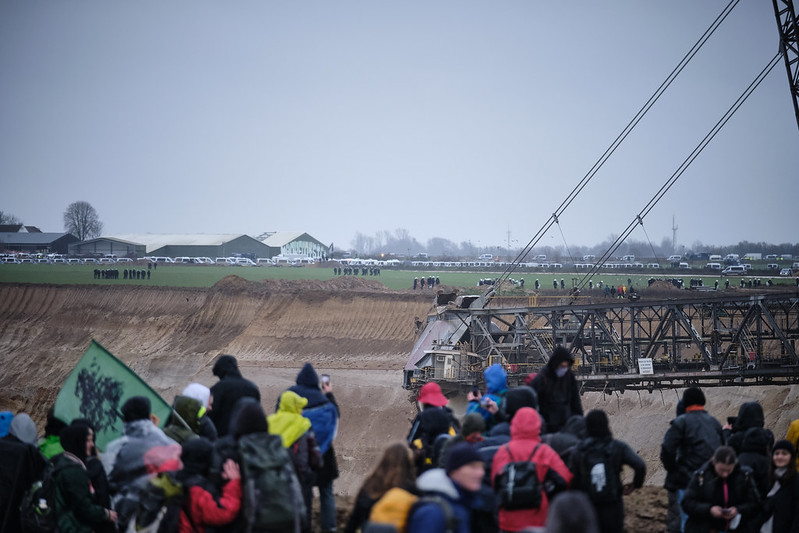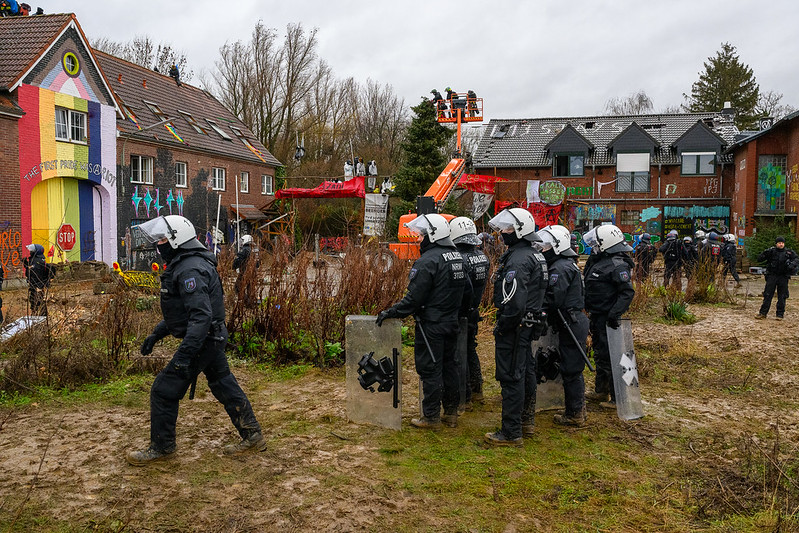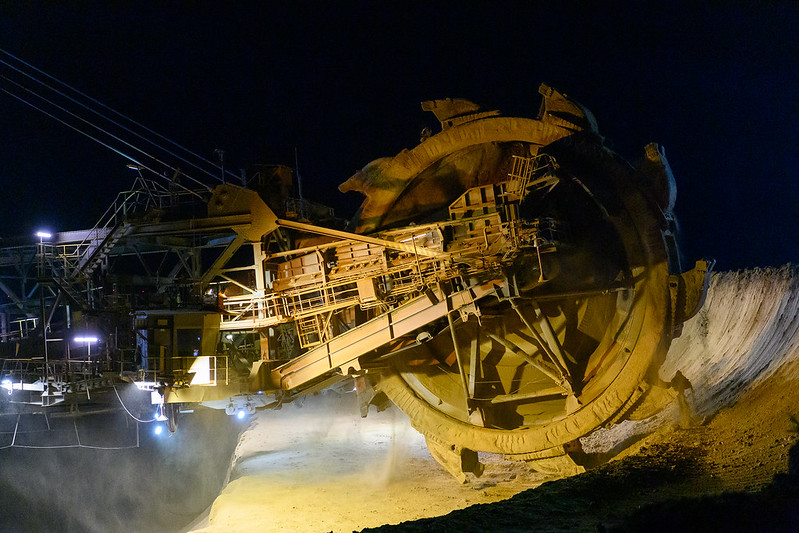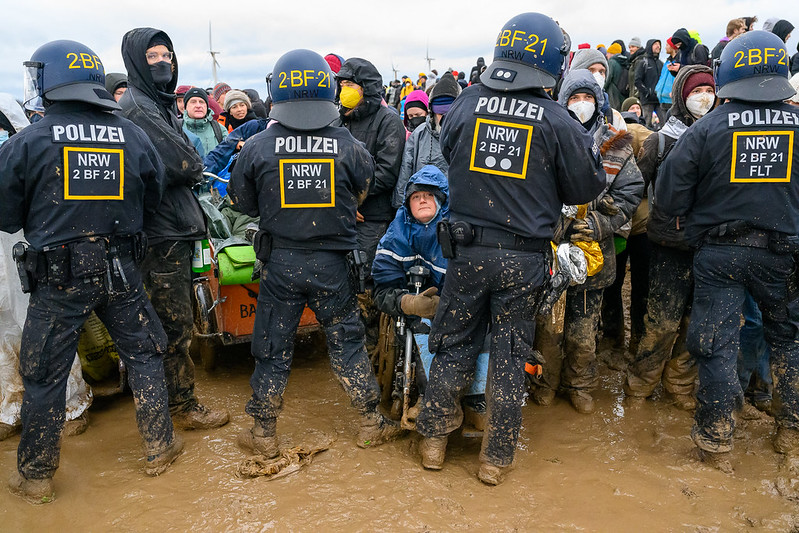Keep it in the ground!
Postat den 18th January, 2023, 10:51 av Maria Fahr
About the protests against brown coal mining in Lützerath, Germany

Protesters walks towards Lützerath, which is surrounded by police, 14/01/2023, Foto: Marco Molitor.
On Saturday 35.000 protesters, including renown climate activists such as Greta Thunberg from Sweden and Peter Donatus from Nigeria, gathered on the fields surrounding the village of Lützerath, protesting against its destruction at the hands of the energy giant RWE which plans to mine and burn the 280 million tons of brown coal located below Lützerath. Brown coal, also called lignite, is known for its ineffectiveness producing energy compared with other types of coal and fossil fuels (e.g., lignite from Lützerath produces half of the heat which hard coal can produce), its disproportionally high levels of CO2 pollution (1 ton CO2 per ton lignite), the destruction of entire landscapes and communities through enormous open pit mines and the systematic artificial lowering of ground watertables (BUND n.d.; n.d.). Thus, brown coal has been called the most climate-damaging fossil fuel. Germany has been one of the largest producers of lignite worldwide since the industrial mining of lignite started in the beginning of the 20th century and has only in recent years been surpassed by China (Enerdata 2023; Baum 2018; Herpich et al. 2022).
Since Wednesday, 18 January 2023, police forces have been evicting activists from the protest camp in Lützerath, which has existed for two years as a dynamic space of anticapitalist grassroots organization. By now, Lützerath is located directly at the open pit mine Garzweiler near Cologne. Heavy police force, drawn together from all over Germany, has been used to evict activists from Lützerath during the past days. As soon as one of the many occupied trees, treehouses, wood constructions, buildings and a self-built tunnel had been cleared from or left by activists, the places have been razed to the ground. As I am writing this text, the initiative “Lützi bleibt!” (Lützi stays!) announces that Lützerath has been evicted completely. Despite intense police presence, a two-fold fence around the village and heavy police violence during the protests and the eviction, activists continue to fight for the brown coal to stay in the ground with clandestine actions in the brown coal mining area in Rhineland Westphalia and solidarity demonstrations around the globe.

Police starts to evict the occupied house “Paula” (left) in Lützerath, 12/01/2023, Foto: Stefan Müller.
RWE, which is the biggest coal mining company in Europe, the German government, and the government of the bundesland Rhineland Westphalia argue that the brown coal below Lützerath is needed to secure electricity during the energy crisis caused by the war in Ukraine. They support their point of view with studies which have been commissioned by Rhineland Westphalia. Other studies have come to the conclusions that (1) the amount of brown coal that RWE can mine in the neighboring coal pit Hambach, already exceeds the amount of coal RWE has been allowed to mine in the so-called German coal exist law of 2019 and (2) that the coal from Lützerath is not needed to get through the energy crisis (Heinrich Böll Stiftung KommunalWiki 2021; Herpich et al. 2022; Oei et al. 2023). Instead, the reason for mining below Lützerath is, according to the study of the FossilExit research group of the University of Flensburg, that RWE can make a lot of profit from the coal especially now during the energy crisis (Herpich et al. 2022). Both the national government and the government of Rhineland Westphalia consist of coalitions of the conservative party CDU and the Green Party, and on the national level the neoliberal party FDP, additionally. The Green party has been in the focus of the critique by climate activists as several representatives had promised that “all villages [in the Rhine area] would stay” (Virnich 2022).

Lignite is mined with 200 meter long excavating machines, of which this is only the bucket wheel. The excavators work 24/7, 03/01/2023, Foto: Stefan Müller.
The German state and RWE are intertwined on several levels. 24% of RWE shares are owned by approximately 140 German communes and state-owned companies, i.e., that these communes make profit if RWE makes profit (Heinrich Böll Stiftung KommunalWiki 2021). Also, Germany has been the number one in Europe regarding state subsidies for fossil fuel industries (Investigate Europe 2020). The so-called coal exit law mentioned above has also been accused of being a coal prolonging law, as it promises 4.35 billion euros to RWE and another coal mining company, LEAG (WECF 2020). More visibly is the collaboration of state politics, state forces and the energy company in how the police has defended the interests of RWE against protesters and how the police and RWE have collaborated. For instance, the police uses transport cars of RWE to hold activists from Lützerath in custody (Der SPIEGEL 2023). Heavy police violence against activists and demonstrators in Lützerath has once again been denied and/or defended by high-ranking politicians, such as Olaf Scholz, the current German chancellor (tagesschau.de 2023; Krüger 2023). But while the political debate about Lützerath now centers around the violence by police against protesters, this text focusses on the (neo)colonial dimensions of the coal mining in Lützerath (tagesschau.de 2023). The (neo)colonial dynamics of what happens in Lützerath have been highlighted by many activists who have stayed at Lützerath during the past years, including e.g., Vanessa Nakate (Fridays for Future Uganda), Juan Pablo Gutierrez (ambassador of the Yukpa), Kaossara Sani (Act on Sahel movement), Ina-Maria Shikongo (Rise up movement, Fridays for Future Namibia) and Adrián Moyano (Author: Cronicas de la resistencia mapuche).
The history of coal mining in Rhineland Westphalia is connected with the German history of colonialism and World Wars, as the coal mined in the area was used to produce enormous amounts of iron and steel for the weapon and war industry, as well as gasoline and fuel for military vehicles and aircraft (Cioc 2002, 79; Baum 2018). In the late 19th and early 20th century German colonial police forces colonized areas in present-day Togo, Cameroon, Tanzania, Namibia, South Africa, China, the Pacific Islands and New Guinea with the help of weapons made with energy from burning coal (Cioc 2002; Conrad 2016). These weapons enabled the German colonial police forces to commit genocides such as the genocide against the Ovaherero and Nama in present-day Namibia on the basis of which German settlers stole the most fertile land available in the region, which their descendants occupy until today (Ossenbrink 2021; Melber 2019). As a European colonizing nation Germany contributed to the expansion of capitalism to a global scale which has resulted in the extraction of natural resources in the global South for the benefit of the global North. Lützerath is a relict and reminder of the destruction that capitalism has also imposed on Europe and especially, on its working class. However, the violence and intensity of destruction still differs: The severity of capitalist exploitation and the (state) violence connected to it is more intense and a lot deadlier in the global South than in the global North (Greenfield 2022).

Riot police stand face to face with protesters heading towards Lützerath, 14/01/2023, Foto: Stefan Müller.
Wouldn’t it be better if Germany used its own coal than energy resources from the global South which are mined under a lot more violent and polluting conditions? Of course, “exporting the problem” to the global South and/or occupied Indigenous lands as done by the German state importing hard coal from Russia, the USA and Colombia is not a solution (Still Burning – network against hardcoal and neo-colonialism 2021). Long term solutions lie in a system change, in a society which is not based on making profits, i.e., non-capitalist, and in renewable energy production, which of course is not free of difficulties either, but at least enables a massive reduction in CO2 emissions. And this is where Germany – as Greta Thunberg said on the demonstration close to Lützerath on Saturday – has an enormous responsibility. Germany belongs to the countries which historically have produced most CO2 and are therefore responsible for the climate crisis (Müller, Braun, and Kriegler 2017). Germany’s wealth as a nation relies on its industry which as mentioned before has been fueled by fossil fuels, especially coal. Germany’s wealth must also be understood in the global colonial and capitalist matrix of power, which over the past centuries has led to the accumulation of wealth in the hands of especially white men of the propertied class (Moore 2019; Mignolo and Walsh 2018; Conrad 2016). In the case of RWE, it is three white men and one white woman of the propertied class who make up the management of the company (RWE 2023). As environmentalist Jason Moore says: We are not equally responsible for the climate crisis, the people who truly benefit from colonial capitalism are only few, they have names and addresses (Moore 2019). In the case of Lützerath, these people are, amongst others, Andree Stracke, Gunhild Grieve, Peter Krembel and Ulf Kerstin from the RWE management (RWE 2023). Of course, it is more complicated than that, because managers can easily be replaced.
Now, that Lützerath has been evicted, what comes next? For now, the coal is still in the ground, and protests continue to keep it there. The global and local ties of resistance against (neo)colonial capitalism which have flourished during the occupation of Lützerath can be seen as a path towards more joint action which hopefully will be more successful in other places.
Maria Fahr

The construction “Denkmal” at Lützerath before it was destroyed by police, 04/01/2023, Foto: Stefan Müller.
For information about the protests against brown coal mining in Lützerath from an activist perspective follow the telegram channel “Lützi – On Site – Ticker”, Invitelink: t.me/onsiteluetzi
Literature
Baum, Carla. 2018. “Flöze, Gruben, Schächte – Geschichte der Braunkohle in Deutschland.” Heinrich-Böll-Stiftung. 2018. https://www.boell.de/de/2018/12/27/floeze-gruben-schaechte-geschichte-der-braunkohle-deutschland.
BUND. n.d. “Braunkohle und Klimaschutz.” BUND für Naturschutz und Umwelt in Deutschland. Accessed January 17, 2023a. https://www.bund-nrw.de/themen/braunkohle/hintergruende-und-publikationen/braunkohle-und-umwelt/braunkohle-und-klima/.
———. n.d. “Braunkohlentagebaue und Gewässerschutz.” BUND für Naturschutz und Umwelt in Deutschland. Accessed January 17, 2023b. https://www.bund-nrw.de/themen/braunkohle/hintergruende-und-publikationen/braunkohle-und-umwelt/braunkohle-und-wasser/.
Cioc, Mark. 2002. The Rhine. An Eco-Biography, 1815 – 2000. Weyerhaeuser Environmental Books. Seattle: University of Washington Press.
Conrad, Sebastian. 2016. Deutsche Kolonialgeschichte. 3. Auflage. C.H. Beck Wissen 2448. München: C.H. Beck.
Der SPIEGEL. 2023. “Lützerath. Warum die Polizei Fahrzeuge von RWE zum Gefangenentransport nutzt,” January 14, 2023, sec. Panorama. https://www.spiegel.de/panorama/luetzerath-warum-die-polizei-fahrzeuge-von-rwe-zum-gefangenentransport-nutzt-a-17703854-058e-4302-9dc8-4b40cb646e33.
Enerdata. 2023. “Coal and Lignite Production Data.” 2023. https://yearbook.enerdata.net/coal-lignite/coal-production-data.html.
Greenfield, Patrick. 2022. “More than 1,700 Environmental Activists Murdered in the Past Decade.” The Guardian, September 28, 2022. https://www.theguardian.com/environment/2022/sep/29/global-witness-report-1700-activists-murdered-past-decade-aoe.
Heinrich Böll Stiftung KommunalWiki. 2021. “RWE Und Kommunen.” 2021. https://kommunalwiki.boell.de/index.php/RWE_und_Kommunen.
Herpich, Philipp, Catharina Rieve, Maren Krätzschmar, Nora Stognief, Paula Walk, Johannes Probst, Alexandra Krumm, Arne Arens, and Pao-Yu Oei. 2022. “Das Rheinische Braunkohlerevier. Aktuelle Zahlen, Daten und Fakten zur Energiewende.” Flensburg: Fossil Exit, Europa-Universität Flensburg. https://vpro0190.proserver.punkt.de/s/cDRQN4pJ9M8a8nY.
Investigate Europe. 2020. “Milliarden-Subventionen gegen die Klimaziele.” Investigate Europe (blog). July 1, 2020. https://www.investigate-europe.eu/de/2020/milliarden-subventionen-gegen-die-klimaziele/.
Krüger, Anja. 2023. “Interview mit Bundeskanzler Olaf Scholz. ‘Ich bin gerne Auto gefahren’.” Die Tageszeitung: taz, January 13, 2023, sec. Politik. https://taz.de/!5905418/.
Melber, Henning. 2019. “Colonialism, Land, Ethnicity, and Class. Namibia after the Second National Land Conference.” Africa Spectrum 54 (1): 73–86. https://doi.org/10.1177/0002039719848506.
Mignolo, Walter D., and Catherine E. Walsh. 2018. On Decoloniality. Concepts, Analytics, Praxis. Durham, US: Duke University Press.
Moore, Jason W. 2019. “The Capitalocene and Planetary Justice.” Maize 6 (July): 49–54.
Müller, Boris, Julian Braun, and Elmar Kriegler. 2017. “A Brief History of CO2 Emissions.” UCLAB FH Potsdam (blog). 2017. https://uclab.fh-potsdam.de/projects/co2/.
Oei, Pao-Yu, Catharina Rieve, Philipp Herpich, Claudia Kemfert, and Christian von Hirschhausen. 2023. “FAQ Und Faktencheck: KEINE Energiewirtschaftliche Notwendigkeit Für Die Abbaggerung von Lützerath | Coal Transitions.” Europa-Universität Flensburg, Technische Universität Berlin, Deutsches Institut für Wirtschaftsforschung. https://coaltransitions.org/publications/faq-und-faktencheck-keine-energiewirtschaftliche-notwendigkeit-fur-die-abbaggerung-von-lutzerath/.
Ossenbrink, Lisa. 2021. “‘If Germany Wants to Reconcile, They Must Give Our Dignity Back.’” Al Jazeera. June 1, 2021. https://www.aljazeera.com/news/2021/6/1/ovaherero-nama-descendants-criticise-germanys-reconciliation.
RWE. 2023. “Management RWE Supply & Trading GmbH.” 2023. https://www.rwe.com/en/the-group/rwest/management.
Still Burning – network against hardcoal and neo-colonialism. 2021. Coal, Colonialism & Resistance. Centering Voices of Affected Communities and Warning of False Solutions. stillburning.net. https://stillburning.net/wp-content/uploads/2021/03/Still_Burning_2021.pdf.
tagesschau.de. 2023. “Räumung Lützeraths. Gegenseitige Gewaltvorwürfe.” tagesschau.de. January 16, 2023. https://www.tagesschau.de/inland/gesellschaft/luetzerath-protest-demonstration-105.html.
Virnich, Birgit. 2022. “Proteste gegen Braunkohleabbau: ‘Werden Lützerath nicht aufgeben.’” tagesschau.de. 2022. https://www.tagesschau.de/inland/luetzerath-101.html.
WECF. 2020. “Milliarden-Subventionen Für Braunkohle.” July 7, 2020. https://www.wecf.org/de/milliarden-subventionen-fuer-braunkohle/.
Det här inlägget postades den January 18th, 2023, 10:51 och fylls under blogg
